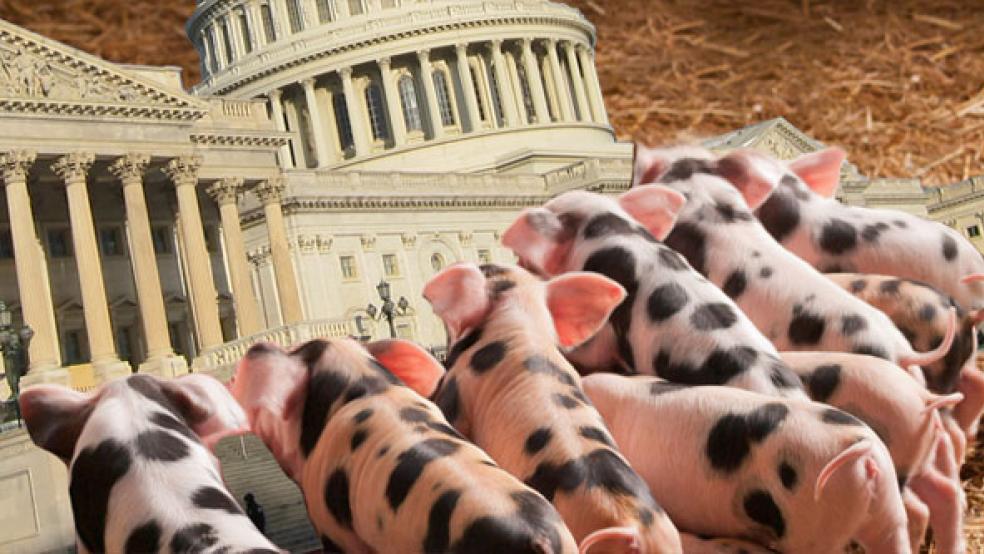Two years ago, Republicans running for Congress pledged to end earmarks. And for the first 17 months with Speaker John Boehner, R-Ohio, at the helm, they did a fairly good job in carrying out that pledge.
According to Citizens Against Government Waste, a conservative watchdog group, the 112th Congress reduced the number of targeted special interest provisions by over 90 percent and the amount earmarked by more than 80 percent, from $16.5 billion to $3.3 billion.
But in the past few weeks, earmarks have re-emerged with a vengeance. And unlike many of the earmarks from an earlier era, which usually involved pork barrel construction projects in member districts like Alaska’s “bridge to nowhere,” the latest round of special interest provisions are designed to benefit specific companies, sometimes in swing districts where vulnerable Congressman are running for re-election.
“There was a pause, but things have devolved to where certain lawmakers have been able to write the laws in certain ways,” said Steve Ellis, vice president for Taxpayers for Common Sense, a progressive taxpayer watchdog group opposed to earmarks. “Some lawmakers are more equal than others.”
For instance, the House Financial Services committee on Thursday passed legislation that will save the owners of Emigrant Savings Bank of New York $300 million. The one-sentence legislation was sponsored by Rep. Michael Grimm, R-N.Y., a Staten Island freshman who won a narrow victory in the normally Democratic district in 2010 and is considered vulnerable this fall.
Bank owner Howard Milstein, a bundler for Barack Obama’s presidential bid in 2008, donated $2,500 to Grimm’s campaign this year, and Democratic co-sponsors of the bill, Reps. Carolyn Maloney, Carolyn McCarthy and Gregory Meeks received $11,500 according to Politico. Representatives from both sides of the aisle are backing the bill, according to Politico.
In another effort to help a specific company, Rep. Fred Upton, R-Mich., inserted a special provision in the Food and Drug Administration user fee reauthorization bill, which passed in committee last week and is expected to pass the full House this week.
The bill included language that would provide a regulatory approval pathway for generic versions of biotechnology products that are coming off patent, allowing scientists at FDA to determine what level of testing would be needed to determine the generic version was safe and effective.
However, if the special provision passes, Endo Pharmaceuticals’ Lidoderm pain relief patch, which had $825 million in sales last year according to The New York Times, will require the maximum level of clinical trial testing. That would make any generic patch almost as expensive as the original Endo product. Endo hired former Democratic Congressman Bart Stupak, once known as a fierce drug industry critic, to lobby both sides of the aisle to pass the bill.
The House Ways and Means Committee, chaired by Rep. Dave Camp, R-Mich., has also recreated the miscellaneous tariff bill process, enabling more than a thousand special interest tariff relief measures to be cobbled together into a single bill and passed by Congress. House rules passed early in this session of Congress included in its definition of earmarks any “limited tariff benefit” that benefited 10 or fewer companies. Scores of clauses in the miscellaneous tariff bill will meet that criteria, critics said.
“There’s a wide variety of ways for Congress to get favors to special interests in their districts,” Ellis said. “There are one-off deals and then there’s things like the miscellaneous tariff bill, which is the full front approach.”
For instance, Roll Call reported this week that Rep. Mike Fitzpatrick, R-Pa., introduced legislation to suspend import duties for a chemical used by United Color Manufacturing Inc., a dye manufacturing firm in his district. The company’s president, Thomas Nowakowski, said it would save his company in the “low six figures” and allow his company to compete with rivals in India, China and Mexico. Two months before the bill was introduced, Nowakowski, a long-time Republican donor, and family members donated $5,500 to Fitzpatrick’s campaign.
Clearly fearing a backlash by conservative groups opposed to earmarks, the House Ways and Means website recently posted a letter from 65 freshman Congressmen backing the miscellaneous tariff bill process. All of them were Republican, and most of them were backed by anti-earmark Tea Party groups in the last election.





